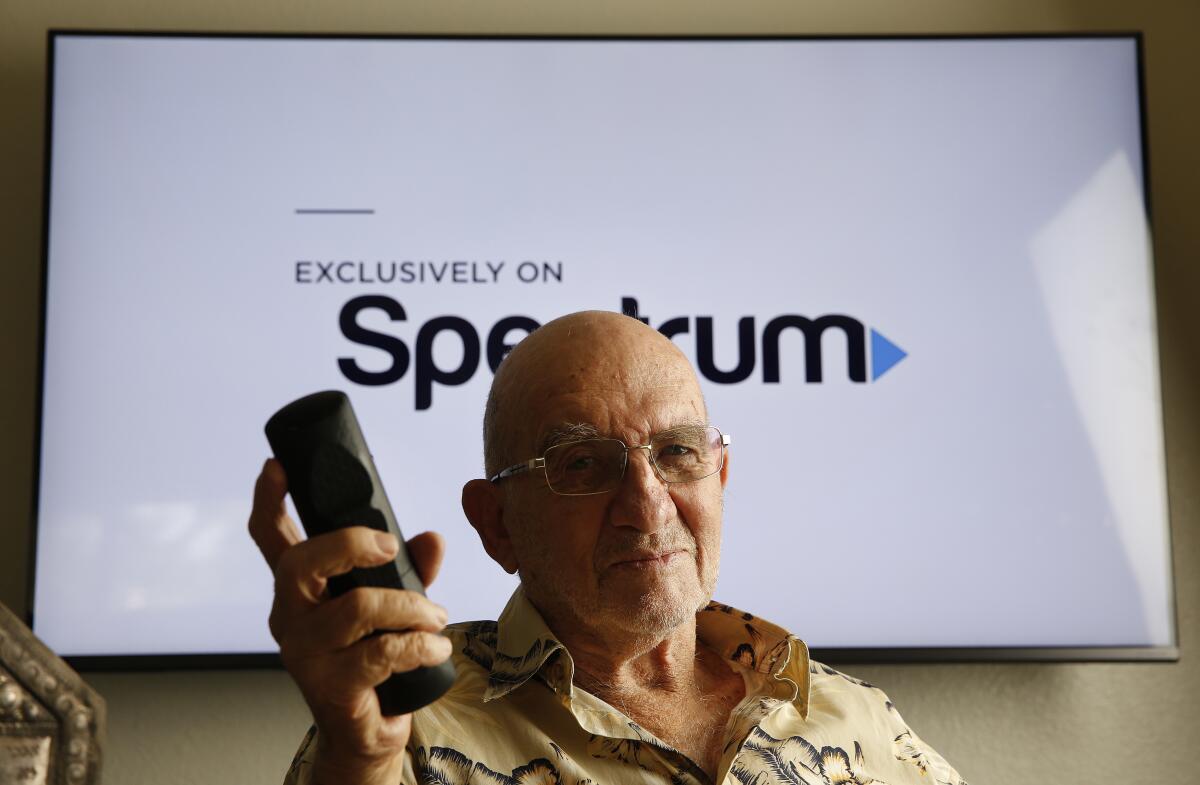If your cable bill includes a fee for ‘Ten,’ you’re paying for a porn channel

- Share via
In hindsight, Gaby Gross recognizes he should have examined his Spectrum cable TV bills more closely. If he had, he would have avoided about $800 in charges for a porn channel he neither wanted nor watched.
Now the 83-year-old Calabasas resident just wants to set things right — and, hopefully, get at least a meaningful portion of his money back.
“Spectrum said I should have contacted them about this back in 2017, when the charges started appearing on my bill,” Gross told me. “Yes, that’s true. But look at my bill. Look how this is presented.”
I did. And he has a point.
Gross’ Spectrum bill clearly shows he’s charged each month for TV programming ($92.49), a cable box ($7.99) and the ability to digitally record programs ($12.99).
It also includes, at the bottom of the list of charges, a $15.99 fee for “Ten.”
That’s it. Just Ten, which, let’s face it, could be anything.
In fact, Ten is the Erotic Networks — T-E-N.
It’s run by Colorado-based New Frontier Media, which is owned by Beverly Hills’ LFP Broadcasting, part of the media empire of the late pornographer and 1st Amendment champion Larry Flynt.
The billing ambiguity is deliberate. A video on the Erotic Networks’ corporate website assures potential subscribers that “we care about your privacy.”
“We will not display the titles of adult-themed purchases on your billing statement,” it says.
Hotels routinely offer the same billing discretion for guests who watch naughty pay-per-view movies in their rooms.
But it’s easy to see how this can result in confusion for anyone who didn’t intentionally sign up for the Erotic Networks or who doesn’t read their bills closely.
“Spectrum said I should have said something from the get-go,” Gross told me. “They said it’s in the bill and I should have looked at the bill.”
The company is correct. This is why, when I’m contacted by people who discover months or years of unwanted charges on cable or phone bills, I understand their frustration but have to acknowledge the onus is on consumers to read their statements.
Gross said Spectrum, with which the Los Angeles Times partners on a nightly TV show, offered to refund two months of payments, or about $32.
“I told them that’s not good enough,” he said.
Normally I’d respond that a partial refund, even a meager offer like this, is probably the best deal he’s going to get and that he should just move on.
But in this case, I think Gross’ situation highlights an inherent unfairness in the billing process, and the circumstances aren’t as cut and dried as Spectrum would have him believe.
The first problem is that he says he never signed up for a porn channel. When Gross pointed this out to Spectrum and asked for details about how his Erotic Networks service began, he said the company replied it had no such records.
That’s not a very good answer, especially in the age of digital databases. Spectrum — or any other service provider — should be able to determine how a customer enrolled in an add-on feature resulting in monthly charges.
By the same token, Spectrum should be able to check and see if Gross viewed the Erotic Networks over the last few years.
If they did check, he told me, they’d see he never watched it, ever, which would validate his position that he didn’t want the service.
Also, and I don’t mean to generalize, when an 83-year-old man says he never intentionally signed up for a porn channel, you might want to give him the benefit of the doubt. (Apologies to all you silver foxes out there.)
But the bigger issue is how the charge is presented on Spectrum’s bill.
No one at New Frontier Media, owner of the Erotic Networks, responded to my requests for comment. But the company’s video clearly indicates it has the ability to influence how its charges will appear on people’s pay-TV bills.
I asked Gross if he thought he’d have spotted it if there was a fee for “the Erotic Networks” alongside the fee for his cable box.
“Of course I would have noticed it,” he answered.
I think so too. The phrase “Erotic Networks” would jump out from any cable bill, whereas “Ten” could be, well, anything — a routine Spectrum charge, a regulatory fee, whatever.
My point is that it’s a lot easier to overlook a $15.99 charge for “Ten” than it is a $15.99 charge for “the Erotic Networks.”
Congress passed legislation in 2019 requiring greater transparency in pay-TV statements. The Television Viewer Protection Act was included in a spending bill signed by then-President Trump.
Among other things, the law stipulates that pay-TV companies are responsible for not surprising customers with hidden fees.
Spectrum including a monthly fee for “Ten” appears to comply with the letter of the law. But I’d argue it ignores the spirit of the law, which was intended to safeguard people from unexpected and unwanted charges.
Again, it’s about giving customers the benefit of the doubt. If there’s a chance a charge or fee can be misunderstood through no fault of the customer, then there’s something problematic about how the charge is presented.
Any reasonable person, I suspect, would agree that identifying a porn channel by a bland, benign name creates at least the possibility of confusion.
Would it have been better if Gross had spotted the charge back when it first started appearing on his bills four years ago? Of course.
But offering a $32 refund for about $800 in unexpected charges seems decidedly tightfisted under the circumstances.
Spectrum’s parent company, Charter Communications, earned nearly $4 billion in profit during the 12 months that ended June 30, up 72% from the same period last year.
Typically, Spectrum is very responsive when I convey a customer issue. In this case, the company took a full week to get back to me, and the response was slim at best.
“This adult content is always individually itemized on the customer’s monthly statement to make clear there is an additional cost,” said Dennis Johnson, a Spectrum spokesperson.
“We will work directly with the customer to resolve their questions about their TV plan and ensure that it reflects their interests going forward.”
I asked if it was potentially misleading to list a porn channel on bills with a nondescript name or an acronym.
“‘Ten’ is the way the service is officially branded,” Johnson replied.
Actually, no. The logo for the channel on its corporate website brands it as “TEN The Erotic Networks.” The site refers to the channel as “the Erotic Networks,” not Ten.
And just because a porn channel wants to be low-key on people’s bills, that doesn’t mean Spectrum and other pay-TV providers have to play along. It’s their bills.
Unfortunately, you can’t make a company put customers first. Profits are almost always a higher priority.
So I’ll say this as strongly as I can: Read your bills. Know what you’re paying for.
And keep in mind that some cable channels don’t want to be recognized.
More to Read
Inside the business of entertainment
The Wide Shot brings you news, analysis and insights on everything from streaming wars to production — and what it all means for the future.
You may occasionally receive promotional content from the Los Angeles Times.









